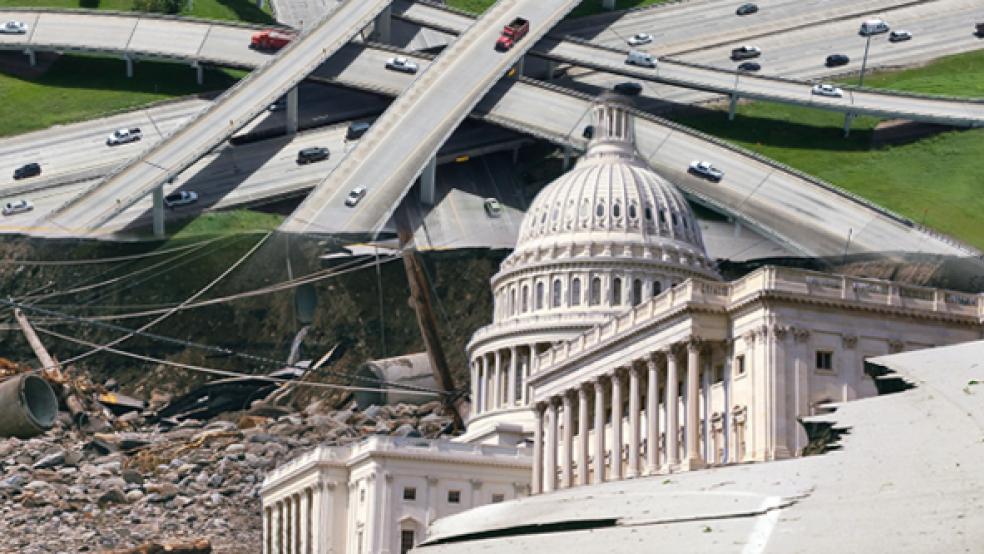It was another clear reminder of just how far apart the two parties are on any number of issues – including how to finance infrastructure spending.
Senate Republicans defeated a Democratic amendment to the proposed 2016 budget on Tuesday. It was aimed at kick-starting negotiations between the White House and Congress over a new multi-year program for funding highway, bridge and other infrastructure projects.
Related: Obama Says China’s Infrastructure Puts the U.S. to Shame
The amendment, offered by Democratic socialist Sen. Bernie Sanders (I-VT), called for $478 billion in new spending over six years but without increasing the deficit. The amendment went down 52 to 45 along party lines.
Sanders, the ranking member of the Senate Budget Committee, had argued his plan was “deficit neutral.” Hundreds of billions in new spending would have been offset by closing a number of corporate tax breaks that allow some major companies to escape paying taxes or stash profits overseas. But Republicans objected and said a large tax increase on business was not the right economic plan. They want to create a new “deficit neutral reserve fund” to supplement federal infrastructure spending.
Republicans don’t specify a total amount of new spending and are leaving it to the Senate Finance Committee to decide how – or whether – to fund a new infrastructure program.
Budget Committee Chair Mike Enzi (R-WY) said he and other Republicans are all for more infrastructure spending. They take issue, however, with Sanders essentially dictating tax reform policy to the Finance Committee by setting a long-term funding target. “That’s not the way we do it around here,” Enzi said Tuesday. “That’s why that went down.”
Yet Sanders and other Democratic leaders dismissed the GOP’s infrastructure reserve fund as a sham. They questioned whether any comprehensive deal could be reached this year given the distance between the White House and the GOP-controlled Congress. The new Congress has until May to approve a transportation and infrastructure program before a temporary funding measure expires.
Related: Governors Join Obama in Infrastructure Spending Plea
The federal Highway Trust Fund, financed through the federal gas tax, is nearly depleted. State governments dependent on federal aid for new highway, bridge and mass transit projects are preparing for a new construction season with no idea how much they can count on for ongoing or new projects.
“It is disgraceful,” Sanders said Tuesday. “No one denies our roads, bridges, waste water plants, water systems and rail are in a state of collapse. We used to lead the world in infrastructure, but now we’re in 12thplace.”
He added, “This amendment proposed $478 billion over a six-year period, which would not only rebuild our crumbling infrastructure but would put some nine million people back to work for the creation of new jobs. That’s a big deal at a time when real unemployment is at 11 percent.”
The American Society of Civil Engineers pegs the U.S.’s current infrastructure spending gap at $125 billion a year just to maintain highways and bridges. In a recent report card, the group gave infrastructure the low grade of D+, noting a tremendous backlog and desperate need for modernization.
Related: How Tax Reform Could Help Save U.S. Infrastructure
Former Treasury Secretary Lawrence Summers recently noted that total federal, state and local government investment in infrastructure is just enough to cover repairs and upgrades of bridges, roads, airports and rails. There’s practically nothing left for expansion.
Senate Democratic Whip Richard Durbin of Illinois called the political stalemate a major disappointment. “This used to be the easiest bipartisan issue before Congress,” he said Tuesday. “There was a time when the Public Works Committee in the House had the largest membership of any committee. Members of both parties couldn’t wait to get on there because this bill enabled them to do things for their districts.”
“Now,” he added, “this has unfortunately become a topic for debate of the Tea Party as to whether the federal government should do anything when it comes to infrastructure. It’s a sad day for the party of [former president] Dwight David Eisenhower and the interstate highway system to have reached this point.”
Everyone agrees a new transportation and infrastructure program is essential. The biggest obstacle has been how to finance it. House and Senate GOP leaders do not want to raise the federal gas tax and would prefer to finance highway spending through tax reform. House Ways and Means Committee Chair Paul Ryan (R-WI) is considering proposals as part of major corporate tax reform this year.
Related: Obama Wants Long-Term Infrastructure Plan, Not Keystone
President Obama’s proposal of a one-time 14 percent tax on nearly $2 trillion of foreign earnings is gaining traction among Democrats and some Republicans as a way to fund infrastructure projects. Major American companies are supposed to pay a 35 percent tax on overseas earnings, but many use a legal loophole that allows them to keep the earnings in other countries indefinitely.
In Obama’s approach, companies such as Apple, Cisco Systems and Microsoft would have a one-time chance to pay taxes on overseas earnings at the much lower 14-percent tax rate. The proposal would also impose a permanent 19-percent tax on foreign earnings.
The plan would raise an estimated $238 billion in the coming years to underwrite infrastructure, while an additional $240 billion would come from the current federal tax on gas and other sources. In all, the six-year $478 billion proposal would provide a 33-percent funding increase for major public works projects.
Top Reads from The Fiscal Times:




